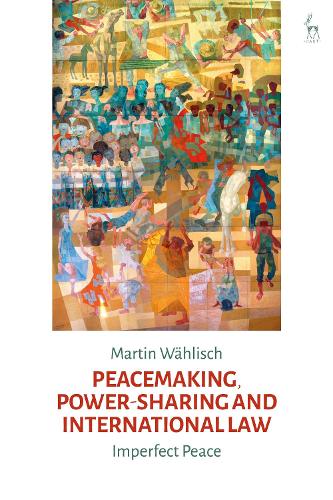
Peacemaking, Power-sharing and International Law: Imperfect Peace
(Paperback)
Publishing Details
Peacemaking, Power-sharing and International Law: Imperfect Peace
By (Author) Martin Whlisch
Bloomsbury Publishing PLC
Hart Publishing
22nd April 2021
United Kingdom
Classifications
Tertiary Education
Non Fiction
341.52
Physical Properties
Paperback
248
Width 156mm, Height 234mm
354g
Description
This monograph provides a contemporary analysis of the frictions between peacemaking and international human rights law based on the cases of postconflict power-sharing in Lebanon and Bosnia-Herzegovina. In this context it evaluates the long-standing debate in the United Nations and human rights bodies about the imperfect peace. Written from a practitionerscholarly viewpoint and drawing from new authentic sources, the book describes the mechanisms used in peace agreements and post-conflict constitutions for managing ethnic or religious diversity, explains their legal limits under international human rights law, and provides a conceptual framework for analysing the nexus between law and peacemaking. The book argues that the relationship between the content of peace agreements and post-conflict constitutions, their negotiation process and the element of time, needs to be untangled to better understand the legal limits of statebuilding in the aftermath of armed conflict. It is a key resource for scholars in human rights law and peace and conflict studies, advisers in peace processes, constitution-makers, and peace mediators.
Reviews
Lasting peace requires the respect for universal human rights. This book offers unique insights into how to find the balance between practical political solutions and the respect for international law. It is a rich resource for peacemakers and conflict parties, and an indispensable read on the phenomenon of the imperfect peace. * Jan Eliasson, Deputy Secretary-General of the United Nations, former Swedish Minister for Foreign Affairs *
A balanced examination of a key issue for mediators and international lawyers alike, the tension between human rights concerns and practical peacemaking. Waehlisch writes with the authority of one who is both an academic but also a political adviser with plentiful hands on experience in the regions from which he draws his case studies, the Balkans and the Arab world. * Sir Derek Plumbly KCMG, King's College London, former UN Special Coordinator for Lebanon *
A rigorous reflection on the tension between peacemaking and the protection of human rights. The focus on two well-chosen case-studies brings the problem to life, and international law is presented in the light of deeply understood practical experience. This illuminating, thought-provoking work deserves to be read by everyone involved in the law, practice or study of peacemaking, statebuilding, or human rights. * Professor David Feldman, Cambridge University, former Judge of the Constitutional Court of Bosnia and Herzegovina *
Is there a law of peace This insightful book deploys a comparative analysis drawing from the Balkans to the Middle East across the scholarly-practitioner divide to elucidate this now evolving normative development. * Professor Ruti Teitel, New York Law School *
Imperfect Peace is an extraordinarily useful and original book that brings together concerns and areas of scholarship and practice that do not always communicate well. Grounded in actual cases it is a must read for anyone interested in peace and the evolution of the international system. * Professor Andrea Bartoli, Dean School of Diplomacy and International Relations, Seton Hall University *
Practitioners and scholars alike will find the monograph helpful not only to understand better the relationship between international law and peace, but how to navigate and use it to best effect. Well-informed, Waehlisch offers a sober yet progressive account with insights about real-world dynamics along with thoughtful suggestions for recurrent problems. Those facing the challenges of transitions will find this a timely and indispensable reference. * Professor John Packer, University of Ottawa, UN DPA Standby Team Constitutions and Process Design Expert *
Author Bio
Martin Whlisch works for the United Nations on peace processes, national dialogues and conflict prevention, and is an Affiliated Lecturer at the Center for Peace Mediation and the Institute for Conflict Management at the European University Viadrina. He holds a PhD in International Law and an MA in Mediation.
